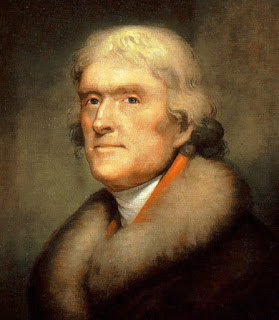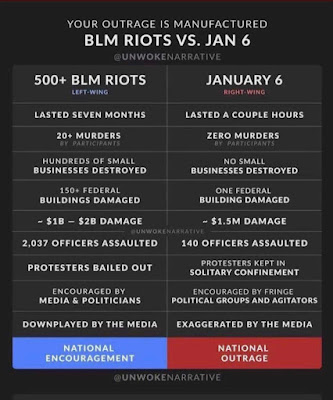★★★ Pages★★★
Sunday, January 30, 2022
Saturday, January 29, 2022
These Pathological Liars Count on the People being Eloi...
They lie about everything. They just count on people not caring or not paying attention. pic.twitter.com/MlexG6v2do
— Maze (@mazemoore) January 29, 2022
Friday, January 28, 2022
The Truth Starting to Come Forth...
New York Times Admits Unvaxxed People Have 'Lower Rates of Infection And Hospitalization' Of COVID-19 Than The Vaxxed. https://t.co/WtFAxcElhk
— Raheem J. Kassam (@RaheemKassam) January 27, 2022
Thursday, January 27, 2022
Wednesday, January 26, 2022
NKVD anyone?
The Capitol police & SGT at Arms need to be subject to FOIA requests, our nation cannot have a pretorian guard. https://t.co/xCg5CPL1Tm
— Joe Kent for WA-3 (@joekent16jan19) January 26, 2022
Tuesday, January 25, 2022
Medical Tyranny!
As a result of the @US_FDA's abrupt decision to remove the EUAs for two monoclonal antibodies, monoclonal antibody treatment sites will be closed until further notice. Full press release is below. pic.twitter.com/RGeWTPwxCs
— Florida Dept. of Health (@HealthyFla) January 25, 2022
Bureaucratic Tyranny!
Thank you @SenRonJohnson for bringing this evil darkness to light https://t.co/NG4mwNwpRP
— Joseph J Flynn (@JosephJFlynn1) January 25, 2022
Friday, January 21, 2022
Wednesday, January 19, 2022
Tuesday, January 18, 2022
Reward tops $250,000 for Capture of Yet Another Racial Justice Warrior... Shawn Laval Smith...
UCLA grad student Brianna Kupfer fatally stabbed while working at high-end LA furniture store
Smith’s lengthy record includes a 2016 arrest in Charleston for attacking a police officer. He pleaded guilty, but it was not immediately clear what sentence he was given in the case that was closed in 2018.
He was later charged in Charleston with felony discharging a firearm in November 2019, the records show.
He was accused of shooting inside a car after a “road rage incident,” causing “mental and emotional injuries to the minor child” who was inside the vehicle at the time, court documents show.
He was freed on $50,000 bail and told not to contact the victims in the case, which appears to still be open."
TRP Jumps 10 SPOTS!!! ONE of the 50 MOST INFLUENTIAL SHOWS in the WURRRLD!!! AGAIN!!! (TSL POWER 50 for 2021)
(REMEMBER WE ARE A "ONCE A WEEK" SPEAKERS OF THE TRUTH INDEPENDENT SHOW COMPETING AGAINST 5-DAY A WEEK NATIONALLY SYNDICATED SELL-OUT SHOWS!!!)
The TSL Power 50 January 18th, 2022 by talkstreamlive
One of the 50 Most Influential and Most Listened-To Streaming Talk Shows from 2021! (Five years in a row!)
Monday, January 17, 2022
Dead Muhammadan Terrorist suspect in the Texas Synagogue Stand-off...
Dead Muhammadan Terrorist suspect in the Texas Synagogue Stand-off...
Sunday, January 16, 2022
Friday, January 14, 2022
Thursday, January 13, 2022
Wednesday, January 12, 2022
Principles of the "early Republicans..."
...Those Principles Thomas Jefferson Founded the Republican party on...
Commonwealthmen (British political writers)
Tuesday, January 11, 2022
Ted Cruz Beginning to Earn Back the People's Trust!
Senator @tedcruz Going Over The Footage Of Ray Epps On January 5th and 6th
— The Columbia Bugle 🇺🇸 (@ColumbiaBugle) January 11, 2022
Senator Cruz: "Ms. Sanborn, was Ray Epps a FED?" (Watch Both Videos)
Jill Sanborn: "Sir, I cannot answer that question." pic.twitter.com/yKJSHUr1eL
Way to go Rand!
Rand brought the receipts https://t.co/Gns1hYeVaj
— Jack Posobiec 🍊 (@JackPosobiec) January 11, 2022
Fed! Fed! Fed!
Sen. Ted Cruz: "Did any FBI agents or confidential informants actively participate in the events of January 6th? Yes or no?"
— Steve Guest (@SteveGuest) January 11, 2022
FBI: "Sir, I can't answer that." pic.twitter.com/mjL6SeHWei
Never Before Seen Emails Directly Implicating Minister Fauci...
🚨BREAKING🚨
— Oversight Committee Republicans (@GOPoversight) January 11, 2022
We've released never before seen emails showing Dr. Fauci may have concealed information about #COVID19 originating from the Wuhan lab & intentionally downplayed the lab leak theory. @RepJamesComer & @Jim_Jordan want Fauci under oath. Time for answers. 1/2👇 pic.twitter.com/p8aIBJ3nom
Saturday, January 8, 2022
Thursday, January 6, 2022
Wednesday, January 5, 2022
Tuesday, January 4, 2022
Sunday, January 2, 2022
Saturday, January 1, 2022
Clasic TRP interview with the Great Dr. Burton Folsom! (12/12/14)
Click Here: to download podcast right click and "Save Target As...or Save Link as..."


























